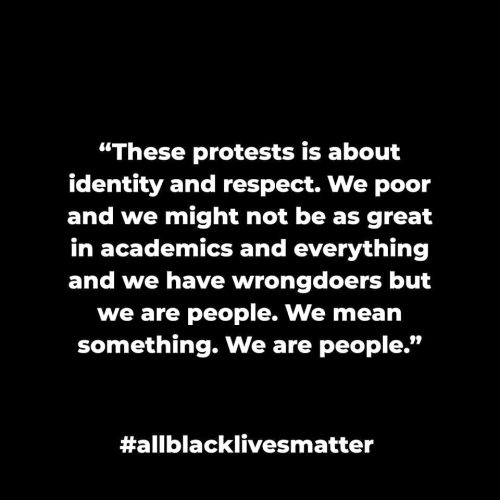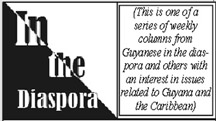By Angelique V. Nixon
Angelique V. Nixon is a Bahamas-born, Trinidad-based writer, artist, and scholar-activist. She is a Lecturer at the Institute for Gender and Development Studies at The University of the West Indies, St. Augustine, Trinidad and Tobago. She is author of Resisting Paradise: Tourism, Diaspora, and Sexuality in Caribbean Culture and an art and poetry chapbook Saltwater Healing – A Myth Memoir and Poems.
“These protests is about identity and respect. We poor and we might not be as great in academics and everything and we have wrongdoers but we are people. We mean something. We are people.”
“I from Morvant. We from Laventille and Morvant. The government don’t take talk from we. We don’t have no links or person to call. They don’t respect we. They only respect tyres burning and stopping people from going to work in Port-of-Spain.”
(Interviews by Amilcar Sanatan, Posted on Facebook)

Years of neglect and marginalisation of Black poor and working-class communities ought to be at the centre of our attempts to understand what is happening in Trinidad and Tobago this past week. Poignant reflections from people in these communities offer context for the protests against police violence and the demands for justice. There is a demand here for people to be seen and respected, and most importantly to be seen as human. The call “we are people” is haunting in the face of the global movement for Black Lives and our colonial/post-colonial struggle against white supremacy. The call for these protests to be understood as being about identity and respect is juxtaposed against the reality that disruptive protests seem to be the only way to gain respect.
Perhaps it might be surprising to some that in predominantly Black and Brown spaces (in the Caribbean), that we too are in this battle, but we must remember that racism is a system embedded in our social and legal fabric. And it is vital to understand that police forces were founded in colonial structures and designed to control the majority of people and uphold power. And so it is no wonder that a predominantly Black police force would enact violence upon poor and working-class Black bodies and communities that are deliberately under-resourced, neglected and dis-advantaged. These spaces are deemed by those in power and the structures in place as “criminal” and therefore punishable. We see this throughout the world where poor people are policed, under constant surveillance, criminalised and kept in vicious cycles of poverty.
Police brutality is nothing new in Trinidad and Tobago, and neither are protests against police violence. Reports indicate that 43 persons mostly of African descent have been killed by police this year. But the most recent extra-judicial killings of three unarmed Black men (Noel Diamond, Joel Jacobs, and Israel Clinton) by police on Saturday 27th June sparked a renewed uprising as many drew comparisons to the devastating murder of George Floyd by police in the U.S. In Trinidad and Tobago last week, police attempted to justify their actions even when a video recording emerged that contested those reports. Protests disrupted traffic and movements in and out of the capital city, and the police responded with excessive force. The public response ranged from varying degrees of support to many expressing disdain for protestors. The ease with which derogatory language (gangs, savages, cock-roaches) was used to describe those protesting by far too many and in particular the police was alarming to say the least, disclosing how easily racist and classist labels can be attached depending on who is out on the streets calling for justice.
Human rights activists and organisations rallied quickly in support of the communities impacted – especially when a pregnant Black woman (Ornella Greaves) was killed by police during the height of protests on Tuesday 30th June. While the attention should have been on why the police continue to enact violence without impunity, much of the public discourse focused on victim blaming, asking why she was out there at a protest. But we should have been questioning why the police force was shooting at protestors and why they are using deadly force on a mostly unarmed public. We should have been asking why the police look like the military in a war zone. We should have been rallying against the Police Commissioner’s policy that police will shoot to kill as necessary. We ought to all be in the streets fighting against police brutality. Perhaps the reason we are not is because the public discourse and representation of “certain” communities and the policing of those communities help middle and upper class people feel safe.
The Trinidad and Tobago Police Service released a statement that framed protestors as pawns who were being paid to destabilise the country. The Police Commission has insisted that the protests are not about police violence but instead have been funded by “criminal elements”. This framing, however, ignores the fact that the protestors and activists from various communities impacted have been consistent and clear in their demands for investigations and justice for the killings of people in their communities. Moreover, the response to those rising up and speaking out against violence has so far been more violence. Videos shared across social media and news reports showed the police brutality against protestors, with tear gas and shots fired into crowds and police in riot gear using excessive force against people speaking out against this very violence. The police are clearly attempting to turn public attention away from their own violent behaviours, making much of their arrest of over 72 persons during protests.
Support for the protestors and their communities has been robust with organisations speaking out and activists insisting that the voices of those most affected must be heard and their stories shared. The intersectional feminist organisation WOMANTRA joined forces with the newly formed Black Lives Matter Chapter in Trinidad and Tobago. Together they launched a social media campaign offering messages of solidarity for the protestors and #AllBlackLivesMatter graphics that include all the neighbourhoods/communities that are often singled out by the Police and Government as “hotspots” where “criminal elements” are harboured or reside, and therefore police violence becomes justified. These communities – Belmont, Beetham, Barrataria, Clifton Hill, Cocorite, Gordan St., Laventille, Morvant, Malick, Nelson St., Observatory St., Pashley St. Pickadilly St., Pioneer Dr., Prince St., Rich Plain, and Sealots, among others – have been highlighted above the refrain “Black Lives Matter” through social media graphics, as a way to visually demonstrate solidarity and to speak out against the demonizing and criminalising of those for whom these communities are their home. Johannah-Rae Reyes of WOMANTRA noted that what she has seen participating in the protests and organising with community members, is poor Black people speaking out against injustice and ongoing violence and wanting their voices to be heard.
The community organisation Groundation, founded by activist and researcher Adeola Young, has put together a team of lawyers who have worked tirelessly to get people out on bail. According to Adeola Young and one of the lawyers working on these cases, not all persons arrested were protestors. Some were on their way home from work or at home in their yard when they were picked up and beaten by the police and jailed. One of the lawyers, Akini Cobbler, reported to Groundation that the jails were horrifically overcrowded with over 50 persons packed into a cell, which violates the COVID-19 restrictions of no more than 25 persons in any public gathering. He also said that persons had been beaten in custody and relatives sat outside the police station for two days asking to see their loved ones. While most of those arrested have now been released on bail, some now have a record and will have to contend with charges of resisting arrest, obscene language, and violating COVID restrictions, among others. This is but one example of how those most impacted in these communities will continue to feel the excessive force of policing and police violence – and why we should all rise up in solidarity and do what we can to speak out against these injustices.
To say that people have a right to protest has been a necessary refrain this past week. Moreover, it continues to be necessary to repeat and affirm that #AllBlackLivesMatter and to call out the racist and classist language used to justify police brutality and violence. We must confront the racist systems and structures of violence embedded in language as we also offer support and solidarity for those on the frontlines. We must dismantle the dominant narratives that deem some bodies more worthy than others, some actions more respectable than others, some people more or less human than others. Raging against this feels to me the most important thing we can do in this moment. This righteous rage is just the beginning of what it looks like to rise up against decades upon decades of neglect, marginalisation and abuse. We should all be outraged. And most of all, we ought to listen to the people in communities most impacted and be guided by their needs.





